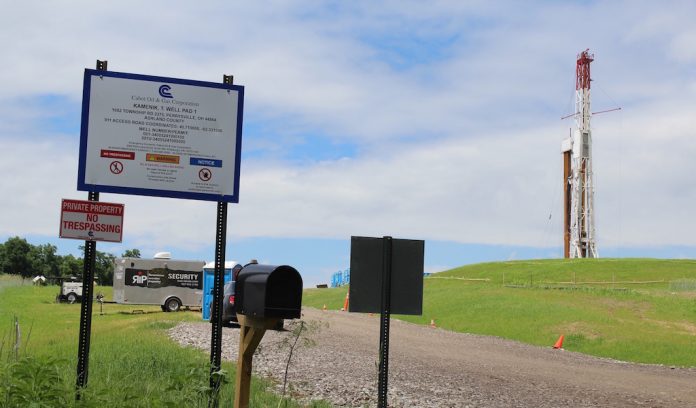LOUDONVILLE, Ohio — As landowners in the Ashland-Holmes-Wayne County area await official production results from exploratory wells drilled by Cabot Oil and Gas, attorneys for the landowners say it also makes sense to wait before signing any new lease agreements.
A group of approximately 50 area farmers and landowners, many whom are part of the Mohican Basin Landowners Association, met in the basement of a church Dec. 13 for an update on drilling and leasing activity.
Houston-based Cabot Oil and Gas has drilled two test wells in the area, with plans for several more, through a sublease agreement with TransCanada, the company that owns many of the old Columbia Gas leases in the area.
Seeking signatures
Over the past couple years, Cabot has had representatives in the area, seeking signatures from landowners that would amend and ratify existing leases, allowing Cabot to perform horizontal fracturing of wells that go beneath the Utica Shale formation.
Cabot insists that because the leases are currently held with TransCanada, that Cabot has the sole right to whatever oil and gas may be extracted. In exchange for signing their lease amendment, they are offering landowners $25 an acre and 12.5 percent production royalties.
But attorneys for the landowners say there are many reasons to wait before signing.
Cody Smith, with the Emens and Wolper Law Firm of Columbus, and Tom White, of the White Law Office in Millersburg, said each lease is unique to each landowner, and should be made on an individual basis, after all factors are considered.
Types of leases
According to Smith, some existing leases contain only “storage” language, which means Cabot may not have mineral production rights for all leases.
Related: Cabot exploring oil and gas potential in north central Ohio.
Smith cautioned against signing the lease now, which he said essentially gives up any opportunity for the landowner to claim production rights later.
“We agree that this is a business decision for each individual landowner, but we’re not sure it’s worth giving up that right to make the claim for just $25 an acre,” Smith said. “If we wait until the Kamenik (first well) starts producing, then we can see how well it is producing and then that can give you sort of a gauge of what to expect in this area.”
A spokesperson from the Ohio Department of Natural Resources said the company is required to report its production by March 31. Farm and Dairy will publish those results once they become available.
White also said it probably makes more sense to wait. He said signing a lease is a often one-shot deal, and it can have ramifications for generations to come.
“You shoot too soon … and you’ve lost that shot,” he said. “You only have one chance to do it right. Do it in a way that your grandkids don’t end up cursing you.”
Compensation
Landowners not only need to think about monetary compensation — but also compensation for potential damages to their property.
The Mohican Basin group presented a more landowner-friendly lease to Cabot, which they said Cabot adopted, in part, but there are still concerns with some of the language in the Cabot leases, according to the attorneys.
One of the biggest concerns, Smith said, deals with how royalties are calculated, and whether the energy company has the right to charge post-production costs.
“While it appears that the proposed amendment ratification prohibits an oil and gas company from taking these post-production deductions from a royalty, there’s a very strong argument that it doesn’t,” Smith said.
Energy companies have argued that oil and gas is marketable or ready for sale as soon as it’s brought to the surface, which allows the energy company to charge post-production costs at any point in the process.
Forced pooling
Landowners at the meeting said they’ve been contacted by Cabot representatives multiple times who urge them to sign, in some cases threatening to force pool, or force a unitization of a landowner’s property, if he or she does not sign.
While force pooling is an option, the attorneys said it’s unlikely to happen at this point in the process, and without the landowner being compensated. An application would have to be filed with the Department of Natural Resources, and the criteria of a forced unit would have to be met.
“Don’t believe everything you hear,” White said. “Especially when you’re talking to somebody who might not have your best interests at heart.”
Peter Huntress, senior landman for Cabot, was also at the meeting.
Huntress said there’s no incentive for landowners to wait to sign, because Cabot has the exclusive contract with TransCanada.
“There’s not a reason to wait, because there’s no competition, and on the other side, the amendment is a benefit to the landowner — it improves the lease that they currently have.”
Vertical wells
He said TransCanada could drill vertical wells, if producers do not sign the amendment allowing for horizontal drilling, but both companies prefer horizontal drilling because it’s more efficient and disturbs less ground at the surface.
He said landowners have challenged the mineral ownership with Columbia in the past, and failed, and that the long-standing leases are still valid.
“Columbia (TransCanada) has an exclusive agreement with Cabot for those rights,” he said. “The amendment and ratification provides more protection for the landowner than the current Columbia lease. They get some benefits in exchange for signing.”











who to believe, Cabot landman or the attorneys representing the landowners..
I would opt for the attorneys and not believe any Cabot landman or Cabot rep who have misrepresented landowners in Pa. for years.
Cabot will try for the best for their interests first.